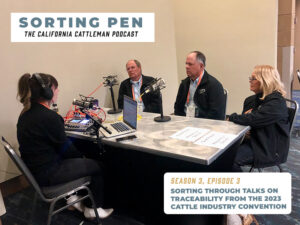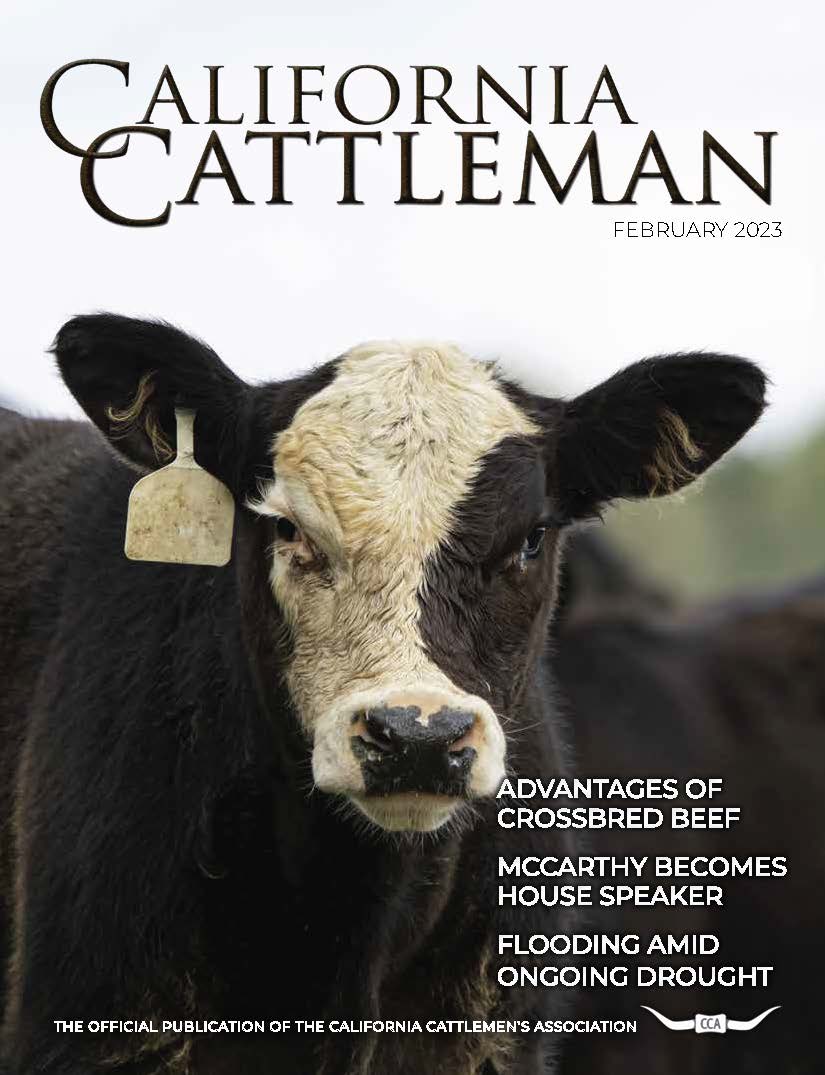
LEGISLATIVE BULLETIN
February 13, 2023
To read the full version each week, please subscribe below.
FSA Begins Accepting Applications for Emergency Conservation Program to Restore Damages from Severe Winter Storms
USDA’s Farm Service Agency (FSA) has announced that it will begin accepting applications today for Emergency Conservation Program (ECP) funds to address damages “to eligible farmland, fences, and conservation structures” caused by the series of severe atmospheric rivers which hit the state from late December to mid-January.
ECP funding may provide up to 75% of the eligible cost of practices necessary to “restore the farmland to pre-disaster conditions,” not to exceed $500,000. Approved practices include debris removal, fence restoration, grading, restoring conservation structures and shaping and leveling. Eligible producers must apply for assistance before beginning repair work.
ECP signups begin today and will be accepted through April 14. Producers in the following 41 counties are eligible for assistance: Alameda, Colusa, Contra Costa, El Dorado, Fresno, Glenn, Humboldt, Kings, Lake, Los Angeles, Madera, Marin, Mariposa, Mendocino, Merced, Mono, Monterey, Napa, Orange, Placer, Riverside, Sacramento, San Benito, San Bernardino, San Diego, San Francisco, San Joaquin, San Luis Obispo, San Mateo, Santa Barbara, Santa Clara, Santa Cruz, Solano, Sonoma, Stanislaus, Sutter, Tehama, Tulare, Ventura, Yolo and Yuba.
For more information, click here. To apply, contact your county FSA office (you can find your county office’s contact information here).
USDA Designates Stanislaus Co. a Primary Natural Disaster Area Due to September’s Excessive Heat
On Thursday, the U.S. Department of Agriculture designated Stanislaus County as a primary natural disaster area due to “Excessively high temperatures that occurred from September 1, 2022, through September 9, 2022.” Counties bordering Stanislaus County – Alameda, Calaveras, Mariposa, Merced, San Joaquin, Santa Clara and Tuolumne – have been designated as “contiguous natural disaster areas.”
Ranchers within primary or contiguous natural disaster areas are eligible for consideration for assistance from the Farm Service Agency (FSA), including FSA emergency loans which can be used for purposes such as replacing equipment or livestock.
The deadline to apply for emergency assistance under the declaration is September 13, 2023 For more information, click here. To apply for an emergency loan or other assistance, contact your county FSA office (you can find your county office’s contact information here).
SWRCB Again Extends Curtailment Suspensions Within Scott River Watershed
On Thursday, the State Water Resources Control Board announced that curtailments in the Scott River watershed remain suspended through midnight this Friday, February 17, so long as flows of 200 cfs are maintained at the Fort Jones gage (if flows dip below 200 cfs, diversion under all water rights listed here must immediately cease).
Otherwise, water rights curtailment suspensions and conditional curtailments remain unchanged from the statuses reported in the January 30 edition of Legislative Bulletin.
Rancher Technical Assistance Program Hosts Flood Assistance Webinar
On Friday, the Rancher Technical Assistance Program hosted a Flood Assistance Webinar for ranchers and producers who may have been impacted by recent storms.
Navdeep Dhillon, the Farm Program Chief for USDA, Farm Service Agency in California provided and overview about the different programs available. These programs include:
- Emergency Conservation Program (ECP) used for disaster recovery. The sign up for ECP opens on Mon. Feb. 13 and is due April 14, 2023.
- Livestock Indemnity Program (LIP) available to livestock producers. Proof of mortality is required to qualify for assistance and notice of loss must be filed within 30 days of the event.
- Emergency Assistance for Livestock, Honeybees and Farm-Raised Fish Program (ELAP) details can be found on this factsheet.
- Tree Assistance Program (TAP) to replant or for vines destroyed or damaged by flooding. The deadline to sign up is within 90 days of when loss becomes apparent.
Emergency low interest loans are available to those with a loss in access of 30%. The deadline to sign up must be within eight months of the disaster.
To view Friday’s webinar, click here. For further information on loan assistance programs click here. RTAP is a joint project developed by the California Cattlemen’s Foundation and Western Resource Strategies, LLC and funded by the California Cattle Council.
Small Business Administration Disaster Loans Available for Six Counties
Agricultural businesses in San Mateo, Santa Cruz, Monterey, San Luis Obispo, Santa Barbara and Ventura counties impacted by recent winter storms and floods that began on Dec. 27, 2022, are eligible to apply for long-term, low interest direct federal loans from the U.S. Small Business Administration (SBA).
According to SBA, “Small nonfarm businesses, small agricultural cooperatives, small businesses engaged in aquaculture and most private nonprofit organizations of any size may apply for Economic Injury Disaster Loans of up to $2 million to help meet working capital needs caused by the disaster.” For further information on these loans click here.
Although the Economic Injury Deadline isn’t until Oct. 16, 2023, SBA advises submitting applications as soon as possible.
For further information on this funding click here.
New Episode of Stories from California Cattle Country
Stories from California Cattle Country, “The Red Bluff Bull & Gelding Sale with Cheryl LaFranchi” is out now. To listen to the episode, click here. Stories from California Cattle Country is produced by The California Cattlemen’s Foundation with support from the California Cattle Council. If you want a glimpse into our travels, follow the podcast’s Instagram account @calcattlecountry.
Upcoming CCA Events
Feeder Meeting
May 24 – 26, San Diego, CA, Marriott Marquis
Early bird registration for the California Cattlemen’s Association Feeder Council and Arizona Cattle Feeders Association Meeting is now open. Register by 3/6 to attend at the best price. Prices will increase 3/7. To Register click here.
The CCA room block is not yet open for reservations. Watch in the coming weeks for a link and full details on booking in the block to be sent out and posted on the event page of our website.
Upcoming Industry Events
2023 Society for Range Management Annual Meeting
Feb. 12 – Feb. 16, Boise, ID, In Person and Virtual
The Society for Range Management’s Annual Meeting will be held Feb. 12-16. The conference will consist of technical tours, sessions and meetings. The meeting will be offered both in-person and virtually. For further information and to register for the meeting click here.
2023 California Rangeland Conservation Coalition Summit
Feb. 24, 2023, Stockton, CA, In Person
The University of California Ag and Natural Resources, the California Rangeland Conservation Coalition and the Range Management Advisory Board have collaborated to host the 2023 California Rangeland Conservation Coalition Summit on Feb. 24. This year’s joint conference titled, “Rangeland and Fire” will provide an array of presentations from ranchers, researchers, CalFire and rangeland agencies. For further information and to register for the event click here.
Ag Legacy Symposium
Feb. 25, 2023, Chico, CA, In Person
The University of California Cooperative Extension Plumas-Sierra is hosting an Ag Legacy Symposium on Saturday, Feb. 25 at the Chico State University Farm. The event will prepare your farm or ranch or agri-business, big or small, for the transition to the next generation. The sessions will cover legal aspects, financial topics, political factors, family dynamics, and provide real life scenarios for you to consider incorporating into your succession plan. Early bird registration is $30 and includes morning refreshments, lunch and workshop materials. To register, click here.
If your business is interested in joining as a sponsor or trade show vendor, please contact Dr. Kasey DeAtley at kdeatley@csuchico.edu or 530-828-4318. For general event questions please contact Tracy Schohr at tkschohr@ucdavis.edu or 916-716-2643.
UCCE Offers AB 589 Water Measurement and Reporting Course
March 2, Davis, CA
The University of California Cooperative Extension (UCCE) will offer a water measurement and reporting course, as authorized by CCA-sponsored AB 589 (2017) and SB 880 (2022), on Thurs., March 2. There will be a limited number of trainings offered in 2023, so early registration is encouraged. Registration is $30; for further details and to register for the training, click here or contact Larry Forero.
UC Davis Bovine Artificial Insemination Clinic
March 27-29, 2023, Davis, CA, In Person
The UC Davis Young Cattlemen’s Association will host a Bovine Artificial Insemination Clinic March 27-29 at the UC Davis Feedlot and Beef Barn. Veterinarians from the UC Davis School of Medicine will teach the clinic. The cost for non YCA members is $425 and $375 for YCA Members. For more information and to register contact Davisyoungcattlemens@gmail.com.
Industry News
Governor Newsom Signs Order to Build Water Resilience Amid Climate-Driven Extreme Weather CDFA “Governor Gavin Newsom today signed an executive order to protect the state’s water supplies from the impacts of climate-driven extremes in weather. After years of prolonged drought, recent storms resulted in the wettest three-week period on record in California.” To continue reading, click here.
Survey Detects 36 Million Dead Trees in California US Forest Service Pacific Southwest Region “A report from the USDA Forest Service reveals about 36.3 million trees across 2.6 million acres of federal, state and private land died in California in 2022. This year, the central Sierra Nevada Range and areas further north showed the highest mortality rates with true firs being the most impacted. The Forest Service and partners throughout the state are working together to remove dead trees and increase forest health.” To continue reading, click here.
How winter’s atmospheric river storms could supercharge California’s wildfire season Fox Weather “‘The heavy precipitation that atmospheric rivers bring increases soil moisture, which in turn spurs vegetation growth and temporarily inhibits fires,’ the authors of the study wrote. ‘However, after a couple of months, the vegetation dries out and provides more fuel to feed fires than would normally be available, resulting in a larger wildfire season.’” To continue reading, click here.
USDA Develops Simplified Direct Loan Application to Improve Customer Service USDA Farm Service Agency “The U.S. Department of Agriculture (USDA) has developed a simplified direct loan application to provide improved customer experience for producers applying for loans from the Farm Service Agency (FSA). The simplified direct loan application enables producers to complete a more streamlined application, reduced from 29 to 13 pages. Producers will also have the option to complete an electronic fillable form or prepare a traditional, paper application for submission to their local FSA farm loan office. The paper and electronic versions of the form will be available starting March 1, 2023.” To continue reading, click here.
Each year at the Cattle Industry Convention and NCBA Tradeshow there are a few issues that rise to the top of discussions. At this year’s meeting, just held Feb. 1-3, traceability was the topic. On the newest episode of Sorting Pen: The California Cattleman Podcast, Past CCA President, Inyo County cattle rancher and veterinarian Dr. Tom Talbot sat down with Katie on the last day of meetings in New Orleans to explain why discussions on traceability are picking up now and what it means for California producers. Later in the episode CCA officers Rick Roberti and Bev Bigger join to ask a few traceability questions of their own. To listen to the episode click here.



